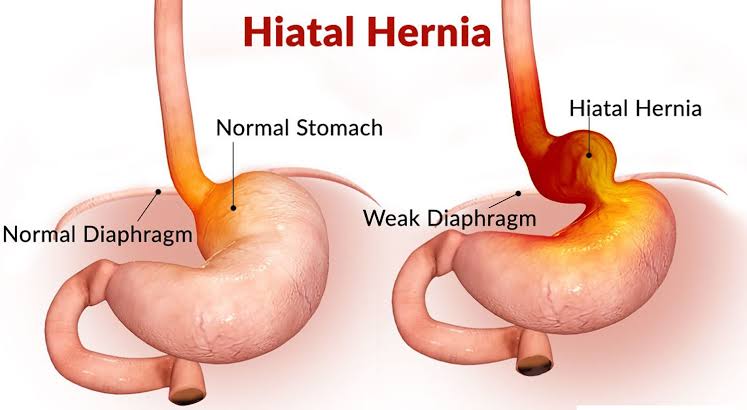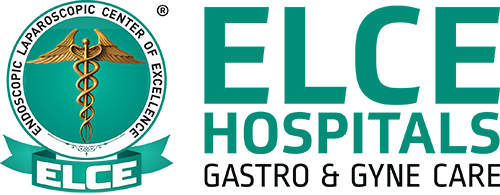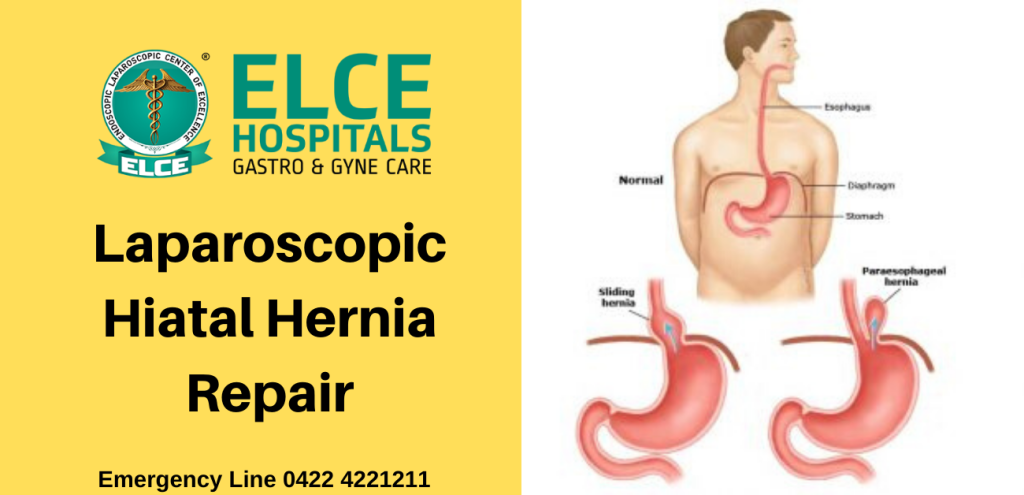What is hernia?
Before we talk about hiatal hernia, we need to know about what hernia is. A hernia is an abnormal projection of an internal organ outside the wall of the organ. A hernia occurs when a part of an internal organ comes out from the place within which the organ should be located that needs immediate laparoscopic hiatal hernia repair.
Most of the hernias occur in the groin region (the area between the abdomen and the upper thigh on either side of the body), excluding the hiatal hernia, which occurs above the stomach.
Though the scope of the blog is Hiatal hernia and its treatment, we should first know about the types of hernia, its causes, and its prevention.
Best Laparoscopic Hiatal Hernia Repair at ELCE Hospitals
Types of Hernia
The various types of hernia are
- Inguinal Hernia: Inguinal hernia occurs when parts of intestinal tissues come out through a weak muscle to the inguinal canals (Either anyone of the left or the right canal or both canals)
- Femoral Hernia: Femoral hernia occurs when fatty tissues or part of the bowel comes out from its place through the weak muscle of the groin area into the upper thigh area
- Umbilical Hernia: Umbilical hernia occurs when part of the intestine comes out near the umbilicus (navel area) creating a bulge in that area.
- Incisional Hernia: An incisional hernia occurs when a wound caused by any surgery does not heal totally. The chances of the occurrence of hernia in that unhealed internal organ are too much.
- Hiatal Hernia: Hiatal hernia occurs when part of the stomach protrudes upward and pushes the diaphragm. That is why it is called diaphragmatic hernia too which needs laparoscopic hiatal hernia repair.
Causes of hernia:
Weakened muscles or fascia (fascia are muscles that hold the internal organ in its place) around internal organs are the main cause of hernia. Internal organs can easily push the weakened muscles around them and can protrude out of their own area which is known as a hernia.
Anything that can cause much pressure in the abdominal muscles can cause a hernia, such as,
- Lifting heavy objects.
- Long term constipation or diarrhea.
- Sneezing or coughing that does not resolve easily.
- Obesity
- Enlarged Prostate
- Problem in urination
Furthermore, drinking too much alcohol, smoking, running a lot without resting, poor diet, etc. also causes the weakening of muscles, which can lead to a hernia that can be cured by laparoscopic hiatal hernia repair treatment.
Abdominal muscles may be weak from birth or it can be weakened anytime after birth for various reasons.
Effective Laparoscopic Hiatal Hernia Repair by ELCE Hospitals
Prevention
It is not a tough job to prevent diseases if you follow a healthy lifestyle always. An unhealthy lifestyle will return you many diseases. Hernia too can be prevented if you follow some healthy measures as follows,
- Do not lift weight beyond your capacity.
- Stop smoking as it causes coughing
- Eat fibrous food so that you do not have constipation as constipation may lead to a hernia.
- Exercise regularly. Physical exercises strengthen muscles and stop them from being loose.
- Maintain proper body weight as per BMI(Body Mass Index)
What is Hiatal Hernia?
The word hiatal comes from the word hiatus. Hiatus means a gap. Our diaphragm has a small opening which lets the esophagus (our food pipe) pass to the stomach. That opening is called hiatus in medical terms. The diaphragm is a thin skeletal muscle which works as a partition between our chest and the abdomen. Internal organs of our chest and upper abdomen are separated through our diaphragm. The weakened diaphragm is the major cause of hiatal hernia. The patient who suffers from hiatal hernia will be provided laparoscopic hiatal hernia repair treatment to get recovered from the disorder.
When the stomach starts pushing the diaphragm because of an increase in its size, then the patient observes many irregularities in their body. Also, an enlarged stomach comes out of the gap of the diaphragm into the chest area. This may cause the esophagus to shrink and can cause swallowing problems. This hiatal hernia shows many symptoms in a patient’s body. Many of them are initially similar to the symptoms of GERD (Gastroesophageal Reflux Disease), commonly known as acidity.

Age group
Hiatal hernia mostly occurs in older people who are above 50 years.
Top Laparoscopic Hiatal Hernia Repair Hospitals – ELCE
The following are the symptoms of Hiatal Hernia.
If the hiatal hernia is not severe many people do not notice any difference in their body unless a doctor finds out it while performing some other medical tests. As in hiatal hernia, the stomach pushes upwards; it shows symptoms that are similar to acid reflux problems.
The symptoms of hiatal hernia include the following,
- Heartburn
- Frequent acid reflux
- Chest pain
- Bloating(Swelling of belly after a meal due to excessive gas production)
- Frequent burping
- Vomiting
- Reflux of food after a meal.
- Breathing problem.
- Bad taste in the mouth
- Stomach upset
When the hernia gets worse a patient will suffer from severe heartburn, chest pain, and acid reflux who needs immediate laparoscopic hiatal hernia repair.
Treatment and Surgery
Many patients with hiatal hernia do not observe any difficulty and hence do not require any treatment. If your doctor diagnoses a hiatal hernia, he may prescribe some medicines along with antacids, which can reduce the hiatal hernia most of the time. Hiatal hernia does not require surgery most of the time.
If the hernia is very large and cannot be reduced using medication then your doctor will suggest for a hernia repair surgery.
The surgery involves
- The repair of weaken esophagus muscles and rebuilding them,
- Pulling the stomach back to its place
Your doctor may go for incisional surgery or laparoscopic surgery. The laparoscopic surgery takes less time and is better than the incision.
Laparoscopic Hiatal Hernia Repair
The laparoscopic surgery can be performed in the outpatient department and the patient can go home on the same day. This surgery requires a minimal incision. This surgery is done after anesthetizing the patient.
This surgery involves the insertion of a laparoscope through the skin into the internal organ where it is herniated. The laparoscope is a thin tube-like instrument with a high definition camera and a light at the end, through which the doctor can see the live condition of the internal organs. After establishing the laparoscope the doctor operates observing the monitor. The herniated part of the stomach is pulled back into its previous position also necessary repairs to the esophageal and stomach tissues are done by the surgeon.
Laparoscopic Hernia Repair is the most common among all hernia surgeries in modern days as it requires minimal incision and the minimum amount of time. The patient can go home on the same day after the surgery and recovers in lesser time than other types of hernia surgeries. ELCE hospitals in Coimbatore have several years of experience in providing laparoscopic hiatal hernia repair for patients suffering from hiatus hernia.

